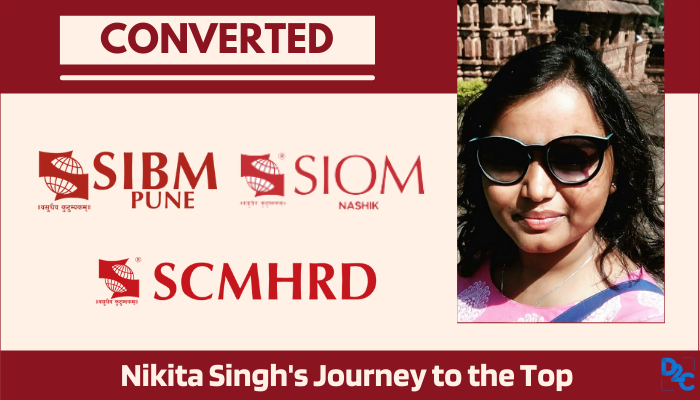A borderline percentile, gap of 1.4 years, and SIBM Pune - Learn how working professionals can crack GD-PI-WAT from Nikita Singh

“I knew that I had to put the best foot forward alone and that the journey was uncertain with a borderline percentile and a gap of 1.4 years.”
While one chalks out the best preparation strategy to ace management examinations, less time is devoted to lateral selection rounds like that of GD, PI and WAT. And getting rejected in either of these rounds is similar to having got the chance to only taste the cream and not eat the cake. Thus, preparation for GD-PI-WAT accounts for similar attention as that of the management exam, especially if you plan to pull through this section by yourself.
The story of Nikita Singh, who will soon be joining SIBM, Pune, is similar. It was by January 2021 when she had bombed most of her MBA exams and was taking Bank-PO exams too. But to her surprise, she got a call from SIBM, Pune. It was then when she started her preparation for online GD, PI, and WAT. She did not enroll in any of the coaching institutes as she felt time constraints and that the coaching institutes focused more on their students with IIM-ABC calls. Hear from her how did she curate her preparation strategy.
GD-PI-WAT Preparation Tips
The following tips were followed by me in the preparation process and, so, would like to share them with you as well:
- Form a group of like minded people (unpaid) approached on whatsapp and facebook. This way, sharing is a faster way to gain knowledge .
- Write and analyse others’ WAT. This gives an additional advantage as mixed people with different coachings come together. Got many insights on heading, 3-paragraph structure, etc.
- Practise GE /GD, with and without moderator. At first there might be hesitation to do it without a moderator but you can always choose one from within the group and improve your fluency and knowledge on various aspects.
- This is a very important step for preparation as it addresses ‘how to start’, ‘correct body posture’, ‘knowledge gap’, and ‘tackling unwanted situations like :machi market’. Even, I formed scenarios on what I'll do, which eased my anxiety on the virtual GD.
- Approach seniors and friends for their inputs and suggestions, try to fill in loop holes in the story. I will really emphasise on this with an example - I had said I practice organic farming but did not know any start up, its history or its future implications.
- Write your skills, weaknesses, and strengths, and try to accumulate important moments of my life. I had written 5 adjectives on each. This is important to expand your vocabulary and support your skills with real life examples. This also improves your credibility. For example: Leader - group leader for research paper, hard working: Commuted daily to college via train and maintained decent CPI etc.
- Form a short life history on yourself
- Revise undergrad subjects and work experience.
- Prepare zoom (or whichever platform on which your GDPI is scheduled), get the latest updated version, set nomenclature and background a night before.
- Practise smiling; it may sound weird but I made sure that I smiled throughout my interview regardless of the experience or grilling.
Every interview is a learning
I scheduled my interviews in order of importance so as to gain from each experience:
1. SIOM
GE & WAT
It consisted of a very intriguing Group Exercise (GE). 4 figures were given and we had to interlink them and form a conclusion based on the discussion. It was a 10-minutes activity to be done by 6 people. The topic for WAT was an easy one.
PI
The panel had 2 professors - 1 female (40) and 1 male (60). The interview started on a general note with reference to my discussion in GE. Then it went on to my work experience and then it was my most dreaded topic - gap!! I was flabbergasted by the way they said “MBA is very hectic, you will not be able to tackle the rigour” and here my life story came up and I informed them about my attributes and provided them with my life experience. The next questions were based on music as I had said it as a hobby.
2. SCMHRD
GD & WAT
The WAT was an abstract picture and 1 line from a novel and we had to connect them and write about them. GD was within a 1 min individual time slot followed by a conclusion .
PI
The panel had 2 professors - 1 female (30) and 1 male (40). PI was based on my hobbies, how to do organic farming, what are some mistakes in it, what are the 5 steps I will tell someone who wants to start organic farming. There were questions on my weaknesses, and if I was given a magic wand what would I change. I had questions on women leaders and how I shall resolve conflict in the workplace, various learnings from my work experience and how I see the workplace in future. It was more of a discussion, they wanted to know my opinions.
3. SIBM PUNE
GE & WAT
WAT was a proctored process. The topic was abstract - something about hydrophobia and a wish. GE was very interactive: 8 pictures, had to select 4 from the 600 points we had, individual 1 minute discussion and then group conclusion. This was totally bizarre as at first everyone wanted to speak but slowly we calmed and spoke. Our story revolved around self reliant India.
PI
The panel had 2 professors - 1 female (30) and 1 male (30). This was tricky as I felt that sometimes it was a discussion and sometimes grilling. I was grilled on my Gap and they wanted proper reasons for what I did. It was the first time I was asked questions from my SNAP form. I was asked questions on my work experience, my key learnings, any adversity I faced being the only lady shift incharge, and how I tackled it. There was a trap too - I was asked if I regret my gap year and if I'll change it, to which I elaborated based on my earlier points only; then they appreciated me. I was asked the key learnings from COVID times, and what changes I would initiate post-COVID.
Key takeaways
- Be Optimistic: Many of my friends converted their only calls.
- Be Honest: There will be a different kind of confidence.
- Beware of Traps: Don't change your opinions in the mid way of your interview, as in my case of gap years.
- Change What You Can: Past mistakes will only be your lesson, don't make it a burden.
- Be Informed: At least 3 months prior to PI, read IMS’ gdpi Bible.
- Don't be intimidated by quora or others' experiences, everyone is unique and everyone gets a chance - just be prepared.
To conclude, there is always a possibility of your winning despite the odds. I still remember the moment - it was 10th March, 5 PM. I had just given my IBPS PO PI and got a call for SIBM, and that was my moment!
For more similar stories, read:
- Meet Ananya who made her way through XLRI Jamshedpur with a percentile of 96.85
- Did not make it to IIMs? Don’t worry, it is not the end!
- 12 management exams, a gap year, and KJ Somaiya - MBA journey of Yuvraj Joshi
- From acing CAT with 99.48 percentile to securing admission into 6 renowned MBA colleges
- From being clueless about MBA to getting 99% in CAT, XAT and IIFT- By Shivansh Mishra From XLRI, Jamshedpur
Login to continue reading
And access exclusive content, personalized recommendations, and career-boosting opportunities.














Comments
Add comment